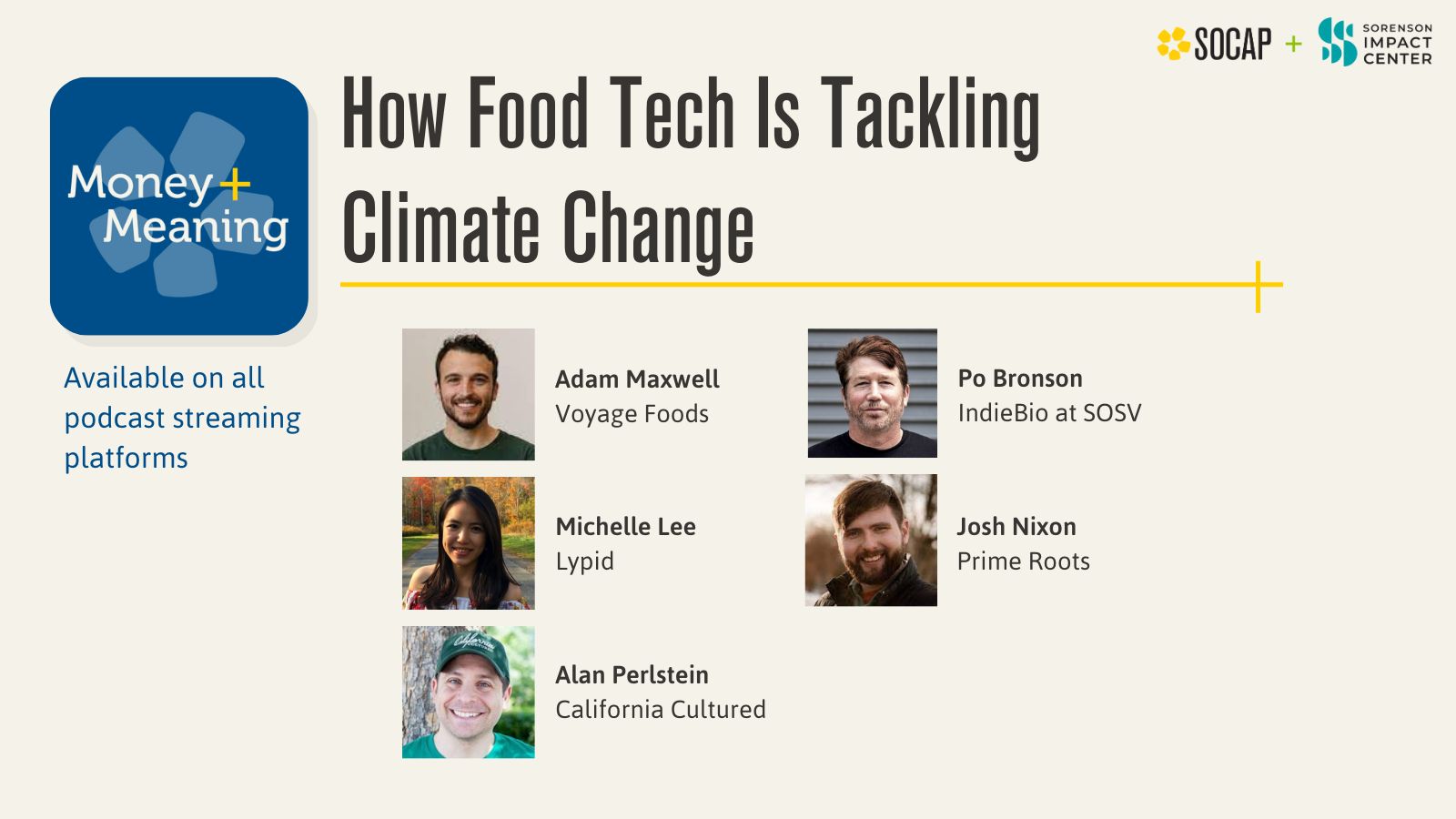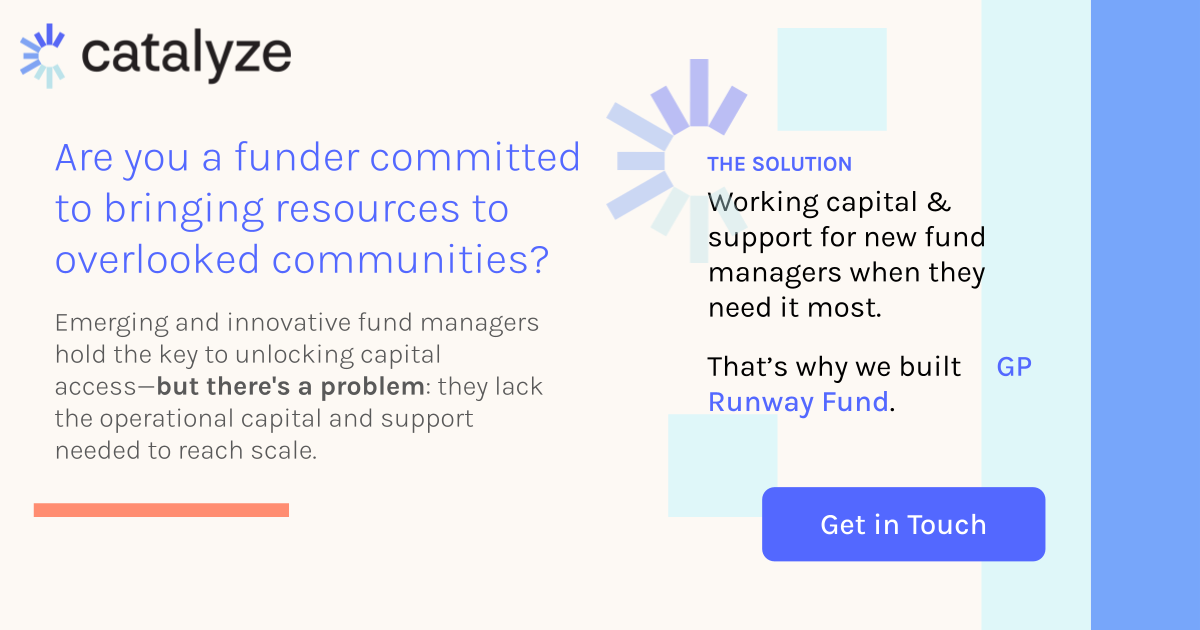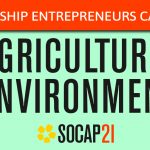A Money + Meaning Podcast with Adam Maxwell of Voyage Foods, Michelle Lee of Lypid, Josh Nixon of Prime Roots, Alan Perlstein of California Cultured, and Po Bronson of IndieBio at SOSV
Technology-driven startups and entrepreneurs are crafting products and methods to reduce the food industry’s greenhouse gas footprint. As they create foods with alternative materials and innovations, they also are shaping a more resilient future for people and the planet.
A new Money + Meaning podcast provides a behind-the-scenes look at leaders and products from four food tech companies. They shared the stories behind their brands — and samples of their creations — during an interactive SOCAP22 session titled The Food Revolution’s Impact on Climate Change.
The session was moderated by Po Bronson of IndieBio at SOSV, a U.S.-based venture fund that allocates about 45% of its assets to climate technology. He said the food tech field continues to grow since SOSV made the world’s first venture capital investment in the cell-based meat sector, with a company now known as UPSIDE Foods.
“It created an incredible movement among young scientists and food people to say, ‘Wow, my work could make a huge impact on the world’ beyond what just tastes good, beyond just helping people,” Bronson said. “At IndieBio, we began to receive applications from all over the world. We have pulled founders from 38 different countries, and we’re very proud that in our search for great founders, over 45% of the companies that we fund are female-founded, female-led companies. It has had an enormous social impact and inspiration.”
However, many people have yet to see these innovative food products as tools for the climate crisis or realize their potential for change. “It’s a very traditional industry, and you have to work with people in their culture,” Bronson said. “Food is our families, it’s our history, it’s our culture. When you bring technology into that space, you cannot deny people their history and their culture. … You have to find ways to adapt and fit in.”
At Voyage Foods, Founder and CEO Adam Maxwell is part of the team using sustainable practices to replicate some of the world’s most problematic and favorite foods. Its products — cacao-free chocolate, allergen-free peanut butter, and bean-free coffee — are made of real food products. By using up-cycled ingredients like grape seeds from wine production, Voyage Foods amplifies its impact by keeping that waste from compost piles and landfills.
“We’re not just taking waste, but we’re avoiding some of the greenhouse gas production from those secondary composts,” Maxwell said. “We’re the most cost-effective, low-cost chocolate and coffee producer in the world.”
Voyage Foods creates coffee and chocolate that will have a long-term impact on lifestyle quality, Maxwell said. “Can our kids have a chocolate chip cookie in 20, 30 years? That long-term sustainability piece is something the world is going to have to confront in a lot of these commodity sectors.”
Coffee and chocolate also are the focus of California Cultured, which uses plant cell culture technology to create sustainable products and avoid harmful practices typical to the sectors. Co-Founder and CEO Alan Perlstein said the chocolate industry depends on 1.5 million child slaves in Africa, South America, and Asia. “These kids are there because their parents can’t pay for school, or many of them were even kidnapped,” Perlstein said. “It’s been a problem for the last 30 years. … We’re trying to support these countries, to give them better options.”
Deforestation also has been incentivized in the industries as a way to speed plant growth and production. “In the Ivory Coast, 95% of their forests were clear-cut. Unfortunately, this is happening in many nearby African countries as well,” Perlstein said. “We’re looking to work with these countries to disincentivize the worst growing and production patterns ever.”
Creating food products that are better for the planet and for people’s health is the goal at Lypid, which produces an alternative fat designed to replicate animal fat. Co-Founder and CTO Michelle Lee said Lypid’s product helps close the flavor gap between alternative and real meats. “We have a mission to … allow more people to adopt alternative proteins and choose some sources that are more sustainable,” Lee said. “It’s better for the climate, and also health is a critical point. The foods we’re eating today are unsustainable and not healthy.”
Personal and environmental health also drive the work at Prime Roots. Co-Founder Josh Nixon said the company aims to produce sustainable deli and charcuterie products that honor the environment and the culture of meat. “If we continue to consume these products in the fashion that we do in the Western world, then globally, by 2050, we’d need about eight Earths worth of natural resources to reach that level of production,” he said. “To maintain this culture, we do need to come up with other ways of achieving it.”
With methods that use less water and land and reduce greenhouse gas emissions, Prime Roots demonstrates how technology can help traditional industries transition to lower-impact production methods. “Plus, there are the health benefits,” Nixon said. “There are large aspects of human health and enjoyment of life … that we believe we can address.”
Listen to the full conversation on How Food Tech Is Tackling Climate Change.
Don’t miss out! Subscribe to Money + Meaning on Apple Podcasts, Stitcher, TuneIn, Spotify, or anywhere else you find podcasts.
Listen to more episodes of Money + Meaning here.
Money + Meaning is the official podcast of SOCAP. The series aims to expand the conversation around impact investing and strategies to finance and support social change while stimulating innovative and valuable new partnerships across sectors.







